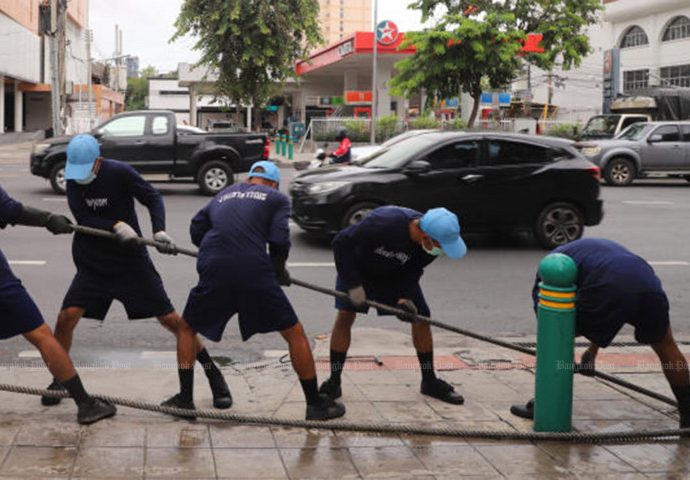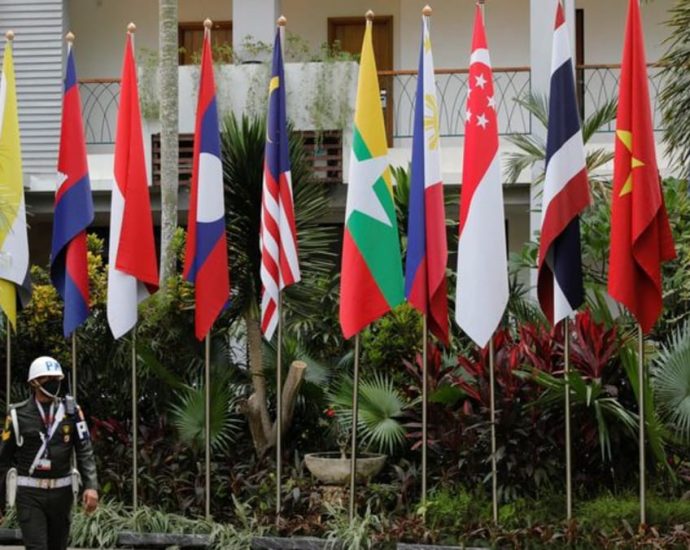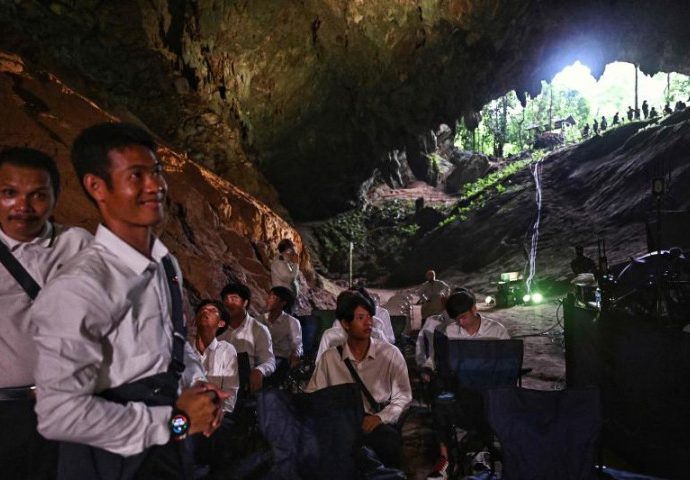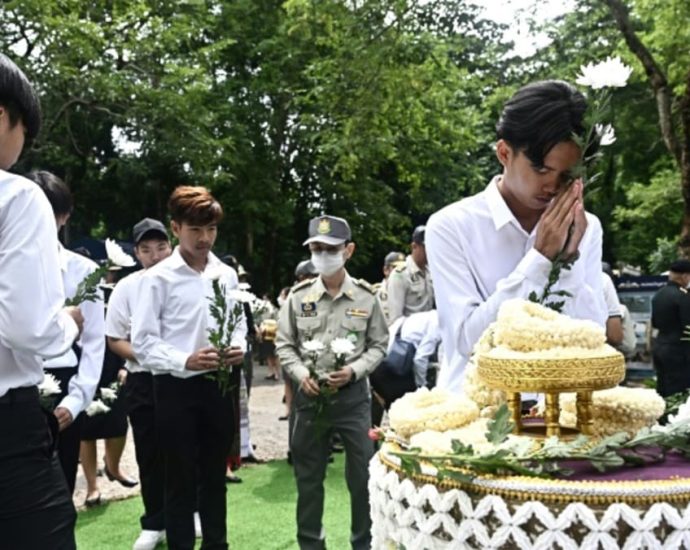Gaming firm Razer probing âpotential hackâ after data offered for US$100,000 worth of crypto
SINGAPORE: Gaming hardware company Razer said on Monday (Jul 10) that it is investigating a potential hack that affected its digital wallet Razer Gold, which customers use to purchase games and in-game content. This comes about three years after Razer suffered a cybersecurity breach that led to the personal information,Continue Reading
Bangkok sewers ‘ready’ for the rain

City Hall has made repairs in more than 500 of 700 areas at high risk of flooding in Bangkok, with officials stating that most low-lying areas can be drained within an hour.
Bangkok governor Chadchart Sittipunt said that Monday’s heavy rain had flooded many areas in the city with the highest water level of 38mm recorded in the Thon Buri area.
The deluge was reported to have caused congestion Monday morning on Chaeng Watthana Road, Vibhavadi Rangsit Road, Bang Khen Roundabout and Rat Burana Road, among others. However, most floodwater was drained within an hour.
Mr Chadchart said that the Bangkok Metropolitan Administration (BMA) had been continuously dredging the drainage system all across the city. However, work was delayed due to many staff from the operation team falling ill with Covid-19.
”More than 500 of 700 flood-prone spots in Bangkok have been fixed and many water pumps were installed to help drain city floods as soon as possible,” he said.
Mr Chadchart also assigned related agencies to handle city floods and look out for commercial and household waste not properly disposed of along the drainage system.
To solve the flood issue in the long run, Mr Chadchart said that the BMA has drafted a blueprint for a newly-designed drainage network flowing out of the city via canals or water tunnels. However, canal communities remain a challenge as dredging often affects the areas they inhabit, he said.
Mr Chadchart said it is crucial to relocate the people living around canals to areas where they can have houses on firm foundations. The BMA will work with the Royal Irrigation Department to improve canal dredging as well as canal community relocation, he said
On Monday the Bangkok Flood Control Centre reported that, from 6-6.30am, Bangkok had moderate rain in Thon Buri areas along the Chao Phraya River, Bang Sue district, Chatuchak district, Phaya Thai district, Ratchathewi district and Pathumwan district.
Bang Bon district was reported as the area with the most rainfall, 37.5-38.5mm.
No decision on Pita’s shareholding yet

The Election Commission has not decided whether to send the iTV shareholding case of prime ministerial candidate Pita Limcharoenrat to the Constitution Court, according to its chair.
EC chairman Ittiporn Boonpracong said after the commission’s meeting on Monday evening that the commission only followed up progress from its fact-finding committee looking into the case of Mr Pita.
The EC earlier received complaints about Mr Pita’s eligibility for political office regarding his past shareholding in iTV.
The commission was asked to forward the case to the Constitution Court which could rule on Mr Pita’s eligibility for political office. If the court accepts the case, it can suspend Mr Pita from political roles pending its ruling.
The constitution prohibits a shareholder of a media organisation from running in a general election. Anyone who runs in a general election while knowing he is unqualified is liable to an imprisonment, fine and political ban. Mr Pita earlier said he had 42,000 shares in iTV only in his capacity as the executor of his late father’s estate.
Mr Pita is the leader and prime ministerial candidate of the election-winning Move Forward Party. MFP and its seven coalition allies agreed to nominate him as prime minister for the House and the Senate to vote on Thursday.
The eight coalition allies had 312 votes in the House and needed at least 64 votes in his favour from senators to secure Mr Pita’s premiership.
The constitution allows 250 senators to join 500 House representatives in voting for a prime ministerial candidate. A prime minister needs support from the majority of the two houses or at least 376 votes from their joint sitting.
On Monday Mr Pita wrote to the EC to ask it to listen to his defence on the iTV shareholding controversy.
In a TV programme interview on Monday Mr Pita refused to reveal the number of senators who would vote for him. He said negotiations with senators were making good progress.
As some senators disagreed with his party’s policy to amend the lese majeste law, Mr Pita said his party only intended to prevent any abuse of the law.
Some senators also said they could abstain in the prime ministerial vote due to the questioned qualification of Mr Pita in running in the general election.
Mr Pita declined to comment on a possible solution in case he fails to gather enough votes for his premiership from the House and the Senate.
The Move Forward Party leader on Sunday said he hoped the House and the Senate would vote in line with the people’s choice in the May 14 general election.
ASEAN foreign ministers to meet amid worsening Myanmar crisis
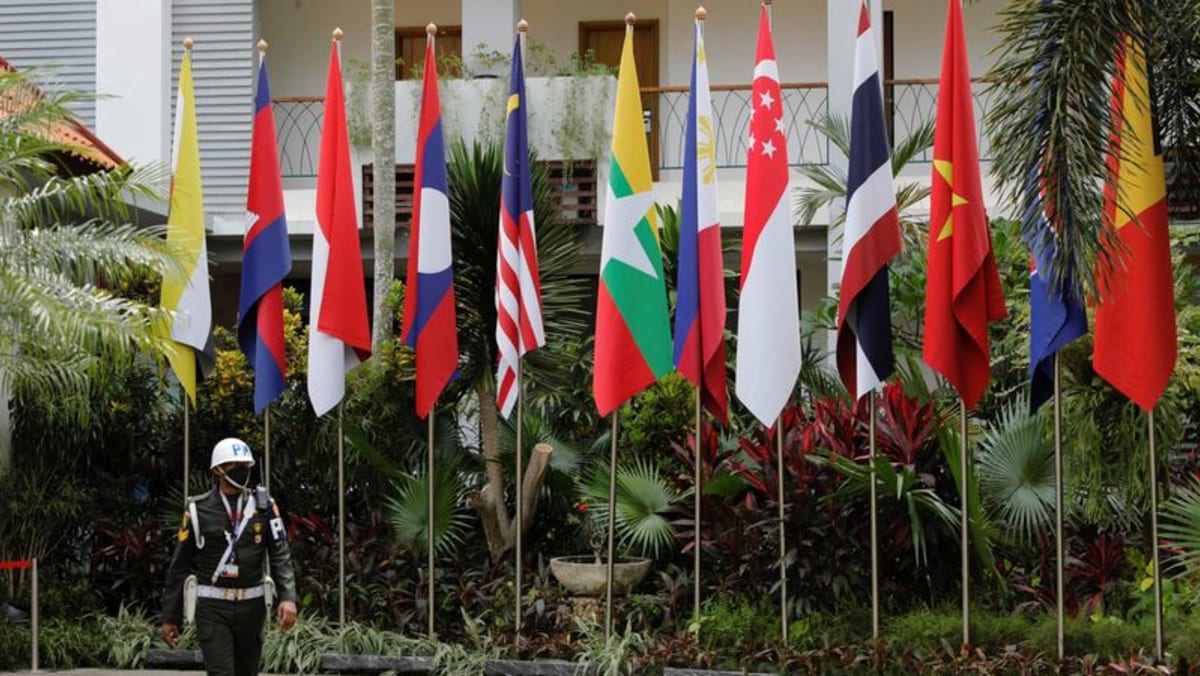
While ASEAN has sent some aid to the country, it has not been able to make further inroads to get victims of the disaster more urgently-needed support, as the military government restricts assistance from international agencies.
This is unlike Cyclone Nargis in 2008, when the grouping managed to broker talks between the then-regime and the UN.
Back then, the West had threatened to apply what is known as the Responsibility to Protect (R2P) on Myanmar, an international principle aimed at protecting civilians.
Observers said the West is currently preoccupied with crises closer to home, and is unlikely to put more pressure on Myanmar in the immediate future.
“Today, it is different. The West is distracted. They have their own problems with (the) ongoing – and possibly protracted – war in Ukraine. And even if the war was to end tomorrow, they will be talking about the reconstruction of Ukraine,” said Ms Sharon Seah, coordinator of the ASEAN Studies Centre at the ISEAS – Yusof Ishak Institute.
“So, those kinds of considerations (such as Myanmar) are no longer there. There is no impetus for any party to quickly step up and work on this.”
RE-ENGAGEMENT WITH MYANMAR
Last year, the bloc made a rare but firm decision to leave Myanmar’s junta out of ASEAN summits and foreign ministers’ meetings.
Some ASEAN member states have recently suggested re-engaging with Myanmar’s military.
Thailand has gone one step further by planning informal talks with the Myanmar army.
Experts said Thailand’s move to initiate dialogue is a positive step forward that could pave the way for more talks with other stakeholders, both within and outside Myanmar.
But Ms Seah cautioned that Thailand should consult the ASEAN Chair so that discussions can align with the Five-Point Consensus, a peace plan adopted in April 2021 between the bloc and Myanmar’s military leaders.
Despite agreeing with the plan, the junta has largely ignored the consensus and little progress has been made in its implementation.
ASEAN leaders have said they will engage with all stakeholders in Myanmar.
However, they also reaffirmed their position at the recent summit in May, where the grouping agreed – again – that the junta will be left out of meetings at the foreign ministers’ and leaders’ level.
Despite international backlash for the bloc’s reluctance to take more drastic action on the junta, some observers argue that ASEAN’s current stance shows that it is united.
This, despite differing opinions on how to deal with Myanmar.
“We see a division in views. There is a group of Myanmar’s most immediate neighbours wanting to solve these issues. On the other hand, there’s another group of countries that have not clearly articulated why they cannot engage with Myanmar,” said Ms Seah.
As ASEAN foreign ministers prepare for this week’s summit, all eyes will be on whether they are able to reach common ground in resolving the crisis engulfing Myanmar.
AI is an existential threat â just not the way you think
The rise of ChatGPT and similar artificial intelligence systems has been accompanied by a sharp increase in anxiety about AI. For the past few months, executives and AI safety researchers have been offering predictions, dubbed “P(doom),” about the probability that AI will bring about a large-scale catastrophe.
Worries peaked in May 2023 when the nonprofit research and advocacy organization Center for AI Safety released a one-sentence statement: “Mitigating the risk of extinction from AI should be a global priority alongside other societal-scale risks, such as pandemics and nuclear war.”
The statement was signed by many key players in the field, including the leaders of OpenAI, Google and Anthropic, as well as two of the so-called “godfathers” of AI: Geoffrey Hinton and Yoshua Bengio.
You might ask how such existential fears are supposed to play out. One famous scenario is the “paper clip maximizer” thought experiment articulated by Oxford philosopher Nick Bostrom. The idea is that an AI system tasked with producing as many paper clips as possible might go to extraordinary lengths to find raw materials, like destroying factories and causing car accidents.
A less resource-intensive variation has an AI tasked with procuring a reservation to a popular restaurant shutting down cellular networks and traffic lights in order to prevent other patrons from getting a table.
Office supplies or dinner, the basic idea is the same: AI is fast becoming an alien intelligence, good at accomplishing goals but dangerous because it won’t necessarily align with the moral values of its creators. And, in its most extreme version, this argument morphs into explicit anxieties about AIs enslaving or destroying the human race.

[embedded content]
Actual harm
In the past few years, my colleagues and I at UMass Boston’s Applied Ethics Center have been studying the impact of engagement with AI on people’s understanding of themselves, and I believe these catastrophic anxieties are overblown and misdirected.
Yes, AI’s ability to create convincing deep-fake video and audio is frightening, and it can be abused by people with bad intent. In fact, that is already happening: Russian operatives likely attempted to embarrass Kremlin critic Bill Browder by ensnaring him in a conversation with an avatar for former Ukrainian President Petro Poroshenko. Cybercriminals have been using AI voice cloning for a variety of crimes – from high-tech heists to ordinary scams.
AI decision-making systems that offer loan approval and hiring recommendations carry the risk of algorithmic bias, since the training data and decision models they run on reflect long-standing social prejudices.
These are big problems, and they require the attention of policymakers. But they have been around for a while, and they are hardly cataclysmic.
Not in the same league
The statement from the Center for AI Safety lumped AI in with pandemics and nuclear weapons as a major risk to civilization. There are problems with that comparison. Covid-19 resulted in almost 7 million deaths worldwide, brought on a massive and continuing mental health crisis and created economic challenges, including chronic supply chain shortages and runaway inflation.
Nuclear weapons probably killed more than 200,000 people in Hiroshima and Nagasaki in 1945, claimed many more lives from cancer in the years that followed, generated decades of profound anxiety during the Cold War and brought the world to the brink of annihilation during the Cuban Missile crisis in 1962.
They have also changed the calculations of national leaders on how to respond to international aggression, as currently playing out with Russia’s invasion of Ukraine.
AI is simply nowhere near gaining the ability to do this kind of damage. The paper clip scenario and others like it are science fiction. Existing AI applications execute specific tasks rather than making broad judgments.
The technology is far from being able to decide on and then plan out the goals and subordinate goals necessary for shutting down traffic in order to get you a seat in a restaurant, or blowing up a car factory in order to satisfy your itch for paper clips.
Not only does the technology lack the complicated capacity for multilayer judgment that’s involved in these scenarios, it also does not have autonomous access to sufficient parts of our critical infrastructure to start causing that kind of damage.
What it means to be human
Actually, there is an existential danger inherent in using AI, but that risk is existential in the philosophical rather than apocalyptic sense. AI in its current form can alter the way people view themselves. It can degrade abilities and experiences that people consider essential to being human.

For example, humans are judgment-making creatures. People rationally weigh particulars and make daily judgment calls at work and during leisure time about whom to hire, who should get a loan, what to watch and so on. But more and more of these judgments are being automated and farmed out to algorithms. As that happens, the world won’t end. But people will gradually lose the capacity to make these judgments themselves. The fewer of them people make, the worse they are likely to become at making them.
Or consider the role of chance in people’s lives. Humans value serendipitous encounters: coming across a place, person or activity by accident, being drawn into it and retrospectively appreciating the role accident played in these meaningful finds. But the role of algorithmic recommendation engines is to reduce that kind of serendipity and replace it with planning and prediction.
Finally, consider ChatGPT’s writing capabilities. The technology is in the process of eliminating the role of writing assignments in higher education. If it does, educators will lose a key tool for teaching students how to think critically.
Not dead but diminished
So, no, AI won’t blow up the world. But the increasingly uncritical embrace of it, in a variety of narrow contexts, means the gradual erosion of some of humans’ most important skills. Algorithms are already undermining people’s capacity to make judgments, enjoy serendipitous encounters and hone critical thinking.
The human species will survive such losses. But our way of existing will be impoverished in the process. The fantastic anxieties around the coming AI cataclysm, singularity, Skynet, or however you might think of it, obscure these more subtle costs.
Recall T S Eliot’s famous closing lines of “The Hollow Men”: “This is the way the world ends,” he wrote, “not with a bang but a whimper.”
Nir Eisikovits is Professor of Philosophy and Director, Applied Ethics Center, UMass Boston
This article is republished from The Conversation under a Creative Commons license. Read the original article.
Wild Boars mark cave rescue 5-year anniversary

Hundreds of people gathered on Monday to mark the five-year anniversary of the dramatic rescue against impossible odds of 12 young footballers from a flooded cave in northern Chiang Rai province.
Now in their late teens, the boys and their coach, Ekkapol Chantawong, descended into the spotlit chambers of the Tham Luang cave complex to pay tribute to the thousands of people who worked for 18 days and nights to get them out.
The “Wild Boars” team had entered the caves in June 2018 and were trapped when rains flooded the complex, emerging after a daring international rescue operation to global acclaim.
“If it weren’t for these people we wouldn’t have survived, and wouldn’t have been alive this day,” Mr Ekkapol said.
“I’d like to say thank you to all of you from the bottom of my heart.”

Members of the Thai “Wild Boars” youth football team line up to pay respects to their late teammate Duangphet “Dom” Phromthep outside the Tham Luang Cave on Monday.
But the joyful anniversary was tinged with sadness following the death of 17-year-old captain Duangpetch Promthep, who passed away while on a football scholarship in Britain earlier this year.
His former teammates each laid white flowers at a memorial image of him outside the caves, surrounded by crowds in the bright sunlight and vivid jungle flora.
A video tribute was also played inside the cave for ex-Chiang Rai governor Narongsak Osatanakorn, who won plaudits for his handling of the incident, and who died last month.
“We must not forget the efforts of everyone involved in the rescue mission, especially of those who are no longer here with us,” said Varawut Silpa-archa, minister of natural resources and environment.
Offerings were also made to Jao Mae Nang Nong — a legendary princess said to be the spirit of the caves in which she supposedly died, and who was frequently invoked for strength during the rescue.

The boys were on a day trip to the cave complex on June 23, 2018, when heavy rains flooded the complex via underground waterways.
They were feared dead until two British cave divers negotiated a series of narrow waterways and corridors and found them on July 2, trapped in a deep chamber, four kilometres from the entrance.
The next hurdle was safely moving the boys and their coach out of the caves.
In a highly risky operation, they were sedated, dressed in wetsuits and breathing apparatus, and hauled through the complex by foreign cave hobbyists, expert divers, and a team of Thai navy SEALs including Saman Kunan, who died during the rescue.
Despite the odds, the boys and their coach all made it out alive.

Adul Sam-on, one of the footballers who shot to fame after he thanked the divers who found them in English, was granted Thai nationality following the rescue, as were his coach and two teammates.
Speaking on Monday, the now-19-year-old said he had just graduated high school in the United States, and would shortly be attending university.
While there has been a steady stream of books, TV series, and film adaptations of the rescue, the boys themselves have mostly kept out of the limelight.
Mongkol Booneiam, known as Mark, said he still lives — and plays football — in a nearby village.
“If I have free time then I try to go play,” he said.
Who should pay developing worldâs climate change bill?
Here are three inconvenient truths. First, the world cannot fight climate change without developing countries. Second, developing countries will need massive amounts of investment for climate financing — and much of these required savings will need to be imported.
Third, the governments of developing countries won’t allow the import of foreign savings if they worry that a backlash from international financial markets might cause financial instability.
The combination of these three truths has produced a predicament that the world has not yet grappled with – that action on climate change is inextricably linked to the financial stability of developing countries, both perceived and actual.
This is a big problem. Estimates of how much investment will be required by developing countries to fight climate change over the coming decades are in the tens of trillions of dollars.
But developing countries, particularly those in East Asia, lack sufficient domestic savings given the massive amounts of investment already needed to reduce poverty and develop their economies, meaning they typically run current account deficits — where a country imports savings from overseas.
These current account deficits can often be a source of financial volatility. When an international shock occurs, countries with a current account deficit greater than 3% of GDP tend to be punished by the market with capital outflows, hurting the financial sector and the exchange rate.
The last few years have been a case in point. As US interest rates have risen, capital has been sharply withdrawn from developing countries and shifted to the United States to enjoy higher returns.
This has caused a sudden tightening of financial conditions in developing countries and pushed down their exchange rates against the US dollar, making their foreign-denominated debts larger and, in some instances like Bangladesh, requiring IMF assistance. The same turbulence was experienced during the taper tantrum in 2013 and the global financial crisis in 2008.

Recent estimates suggest that if developing countries were to import the necessary foreign savings to fight climate change, their current account deficits could increase substantially. This is a terrifying thought for developing country finance ministers who have become hypersensitive to growing current account deficits.
The result is that policymakers limit financial inflows using monetary policy and macroprudential tools to keep the current account deficit in check, constraining economic growth — and in the process, constraining the sustainable investment needed to fight climate change.
To be sure, recent international turbulence has revealed that developing countries, particularly in Asia, have come a long way in bolstering the resilience of their financial systems.
Decades of reform have strengthened risk monitoring frameworks, hedged risks, liberalized exchange rates, deepened financial systems, strengthened supervisory mechanisms and improved resolution processes for troubled banks and financial institutions.
Not all developing countries face the same challenges, and not all developing countries have the same contribution to climate risks. And there is only so much developing countries can do. While recent crises have revealed how far developing countries have come, they’ve also shown their continued susceptibility to global shocks.
If developing countries are to import the foreign savings needed to fight climate change, the rich world and the institutions it controls will need to work with them to reduce financial instability.
Luckily, there are practical things that can be done. At the global level, efforts to reform the lending conditions of the International Monetary Fund need to be continued, to reduce the stigma which stops developing countries from seeking assistance.
Development banks, like the Asian Development Bank at the regional level and the World Bank at the global level, can provide finance directly through concessional lending and grants to ease the financing burdens of developing countries.
An emerging deal between China and the World Bank will likely see China agree to reschedule some of its loans to developing countries where, in return, the World Bank will increase its lending to developing countries, including for climate action.
The COP27 agreement to loan Indonesia US$20 billion will also help. But given that the size of the green investment required dwarfs the resources of these institutions, development banks will need to be more innovative and use their balance sheets to help backstop the liquidity of developing country governments as they undertake sustainable investments.

Bilaterally, rich world central banks need to use currency swap lines and standby loans to plug the gaps in the safety net and ensure that all developing countries have access to foreign exchange in times of need.
And international institutions need to support developing countries by implementing the tools and mechanisms that the countries need domestically to manage risks from capital inflows.
These tools and mechanisms can also help them to price carbon domestically as part of a global approach and implement domestic regulatory reforms to fight climate change, including the elimination of fossil fuel subsidies.
In a nutshell, climate change is a global challenge that will be won or lost in developing countries. All countries have a shared incentive to ensure the necessary investments are undertaken in developing countries — and that means all countries have a shared incentive to bolster the financial stability of developing countries.
If the last two years have shown us anything, it’s that we have a long way to go.
M Chatib Basri teaches in the Economics Department at the University of Indonesia and was formerly Indonesia’s Minister of Finance.
Adam Triggs is Partner at Mandala and Non-Resident Fellow at the Brookings Institution and the Crawford School of Public Policy, The Australian National University.
This article was originally published by East Asia Forum and is republished under a Creative Commons license.
Japan prosecutors to pursue retrial of man who spent decades on death row
TOKYO: Prosecutors in Japan will pursue the retrial of an 87-year-old former boxer – considered the world’s longest-serving death row inmate – nearly six decades after he was convicted of murder, an official said on Monday (Jul 10). The decision comes after Tokyo’s High Court in March ordered the retrialContinue Reading
Extortion suspected in Germanâs disappearance
Two foreigners questioned, refuse to give statements

CHON BURI: Police suspect extortion was the motive in the disappearance of a wealthy German businessman in Pattaya last week.
They have identified a woman believed to have pointed him out to his abductors, and the recipient of money paid by the missing property broker, 62-year-old Hans Peter Ralter Mack, Pol Gen Surachate Hakparn, deputy police chief, said on Monday.
He said police would find Mr Mack, whether he was alive or dead.
Investigators were compiling their case to apply for court warrants and he expected an arrest in the near future.
“The case concerns assets. The offender seemed to know that Mr Mack had assets. Detectives must find out if he knew Mr Mack personally,” the deputy national police chief said.
Police would also look into the business activities of other people in the case, he said.
The missing man’s silver Mercedes-Benz E350 coupe was found by police on Sunday morning in the CC Condominium parking lot on Khao Noi road in tambon Nong Prue.
Pol Gen Surachate confirmed reports that a chemical cleanser had been used inside the vehicle in an attempt to destroy evidence.
Two foreigners were called in for questioning at Nong Prue police station in Bang Lamung district on Sunday night in connection with the case. Their names and nationality were not disclosed. They were accompanied by their lawyers.
Pol Col Tawee Kudthalaeng, Nong Prue police chief, said the two declined to give statements, saying their lawyers would represent them in any legal proceedings.
A woman suspected of involvement in Mr Mack’s disappearance was earlier called in for questioning. She also declined to cooperate, saying her lawyer would act on her behalf.
Later on Sunday night, Pol Maj Gen Theerachai Chamnanmor, chief investigator of Provincial Police Region 2, led immigration and tourist police, with a court warrant, to search house 21/302 in Chok Chai Garden 2 housing estate at Moo 10 in tambon Nong Prue. The house belonged to one of the suspects. Police did not find anything suspicious in the house.
Sources said investigators had detected suspicious financial transactions totalling about 2 million baht which might be linked to the man’s disappearance.
Mr Mack, 62, has not been seen since July 4. His Thai wife, Piriya Boonmark, said he left their Swiss Paradise housing estate home in Pattaya in his Mercedes Benz to meet a foreign property broker he had recently met.
The family filed a missing person complaint with police on July 5 and later offered a reward of 3 million baht for information on Mr Mack’s whereabouts, and 100,000 baht on his car.

Hans Peter Mack, the missing 62-year-old German businessman. (Photo: Chaiyot Pupattanapong)
‘We must not forget’: Thailand marks cave rescue anniversary
Despite the odds, the boys and their coach all made it out alive. Adul Sam-on, one of the footballers who shot to fame after he thanked the divers who found them in English, was granted Thai nationality following the rescue, as were his coach and two team-mates. Speaking on Monday,Continue Reading


